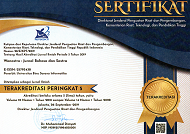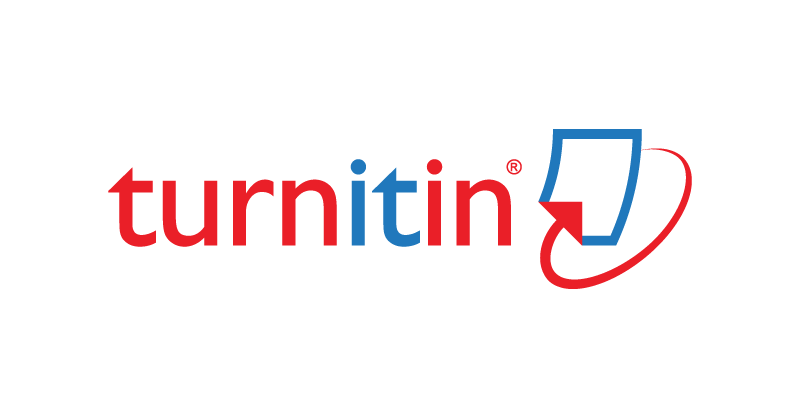Increase Learning Motivation and English Speaking Skills through Cooperative Learning Management with Discovery Learning Model and Buzz-Tapps Technique
Abstract
Full Text:
PDFReferences
Arsyad, M. H. (2019). Metode-metode pembelajaran bahasa Arab berdasarkan pendekatan komunikatif untuk meningkatkan kecakapan berbahasa. Jurnal Shaut Al-Arabiyah, 7(1), 13–30.
Damayanti, D., & Nuzuli, A. K. (2023). Evaluasi efektivitas penggunaan teknologi komunikasi dalam pengajaran metode pendidikan tradisional di sekolah dasar. Journal of Scientech Research and Development, 5(1), 208–219.
Gunadi, G., Prasetyo, T., Kurniasari, D., & Muhdiyati, I. (2023). Peningkatan Keterampilan Menulis Puisi Bebas dengan Metode Experiential Learning pada Siswa Sekolah Dasar. Jurnal Studi Guru Dan Pembelajaran, 6(1), 35–43.
Hartono, D. P., & Asiyah, S. (2019). PjBL untuk meningkatkan kreativitas mahasiswa: sebuah kajian deskriptif tentang peran model pembelajaran PjBL dalam meningkatkan kreativitas mahasiswa. Jurnal Dosen Universitas PGRI Palembang.
Malik, A., & Chusni, M. M. (2018). Pengantar statistika pendidikan: Teori dan aplikasi. Deepubish.
Melati, E., Kurniawan, M., Marlina, M., Santosa, S., Zahra, R., & Purnama, Y. (2023). Pengaruh Metode Pengajaran Berbasis Teknologi Terhadap Kemampuan Berbicara Dalam Pembelajaran Bahasa Inggris Di Sekolah Menengah. Jurnal Review Pendidikan Dan Pengajaran (JRPP), 6(4), 14–20.
Napitupulu, R. H. M., Handayani, C., & Haryati, H. (2021). Metode Simple Additive Weighting (SAW) Untuk Menentukan Karyawan Outsourching Terbaik Di PT Bank BNI Cabang Cirebon. Bina Insani Ict Journal, 8(2), 166–175.
Ratnadi, N. N. A., Arlinayanti, K. D., & Marleni, K. D. (2022). Penerapan Metode Bermain Peran Terhadap Kemampuan Berbahasa Inggris Pada Siswa Sekolah Dasar. PEDAGOGIKA, 192–199.
Revianti, S. L., & Anggoro, P. D. W. (2022). Interaksi kolaboratif menggunakan virtual reality berbasis web dalam pembelajaran bahasa inggris. JIKO (Jurnal Informatika Dan Komputer), 6(1), 102–114.
Rita, D. (2022). Peningkatan Keterampilan Berbahasa Inggris Menggunakan Gallery Exhibition Project dalam Pembelajaran Bahasa Inggris pada Topik Report Text. Journal of Educational Learning and Innovation (ELIa), 2(1), 96–120.
Siregar, U. D. (2023). Bahasa Inggris sebagai Bahasa Komunikasi Bisnis di Era Globalisasi: Persepsi Pebisnis dan Karyawan. JBSI: Jurnal Bahasa Dan Sastra Indonesia, 3(01), 129–135.
Suryadi, P. G. E., Agustini, K., & Sugihartini, N. (2018). Pengaruh e-modul berbasis model pembelajaran project based learning pada mata pelajaran videografi terhadap hasil belajar siswa kelas XI desain komunikasi visual di SMK Negeri 1 Sukasada. Jurnal Nasional Pendidikan Teknik Informatika: JANAPATI, 7(3), 302–314.
Susanti, W., Kom, S., & Kom, M. (2021). Pembelajaran aktif, Kreatif, dan Mandiri pada mata kuliah algoritma dan pemrograman. Samudra Biru.
Syaparuddin, S., Meldianus, M., & Elihami, E. (2020). Strategi pembelajaran aktif dalam meningkatkan motivasi belajar pkn peserta didik. Mahaguru: Jurnal Pendidikan Guru Sekolah Dasar, 1(1), 30–41.
Wijaya, H. (2020). Analisis data kualitatif teori konsep dalam penelitian pendidikan. Sekolah Tinggi Theologia Jaffray.
DOI: https://doi.org/10.31294/wanastra.v16i1.21845
Copyright (c) 2024 Syaharuddin Syaharuddin

This work is licensed under a Creative Commons Attribution-ShareAlike 4.0 International License.
Index by:
Published by Department of Research and Community Service (LPPM) Universitas Bina Sarana Informatika by supported Relawan Jurnal Indonesia
Jl. Kramat Raya No.98, Kwitang, Kec. Senen, Jakarta Pusat, DKI Jakarta 10450

This work is licensed under a Creative Commons Attribution-ShareAlike 4.0 International License






